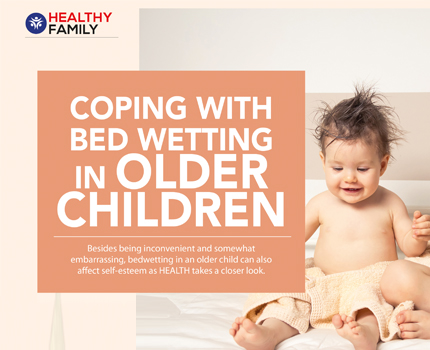 Besides being inconvenient and somewhat embarrassing, bedwetting in an older child can also affect self-esteem as HEALTH takes a closer look.
Besides being inconvenient and somewhat embarrassing, bedwetting in an older child can also affect self-esteem as HEALTH takes a closer look.
DEFINED
Otherwise known as nocturnal enuresis, this is defined as bedwetting over age five. Dr. Ravinder Kumar Bhatt, Specialist Internal Medicine explains that this is uncommon because by age seven, children are able to control their micturition reflex and their nervous system is well developed.
TYPES
There are two types of nocturnal enuresis. Primary nocturnal enuresis is when a child has never developed complete nighttime bladder control. Secondary nocturnal enuresis is when a child has accidental wetting after having had bladder control for six or more months. It is more common in boys and in families in which one or both parents wet the bed as a child. “In fact, 15 percent of fiveyear-old children are bed wetters and 15 percent of those will be spontaneously cured each year without any treatment,” explains Dr. Bhatt. “A bedwetting child fails to recognize the sensation of a full bladder during sleep and thus fail to awaken during sleep to urinate.” Most people, around 80 percent, who wet their beds, wet only at night.
CAUSES
Dr. Bhatt says that a few common causes of bedwetting in an older child may include high urine production during night, small functional bladder capacities, poor arousability from sleep, and a family history of bedwetting and/or chronic constipation putting pressure on the bladder. “A worsening of bedwetting can take place if there are renal or nervous system problems,” he explains while other factors include diet, dairy products, citrus fruits, chocolate, and foods containing high levels of artificial color and sweetener have been connected with bedwetting. Dr. Bhatt says that a psychological cause also plays a part in bedwetting. Various causes are parental marital discord, child neglect, fear or phobias, conflicts at home and school, arrival of a new baby, loss of a pet, and child insecurity. However, some children who wet the bed tend to be less mature and self-reliant than those who do.
THERAPY
Motivational therapy involves parents encouraging and reinforcing a child’s sense of control over bed-wetting. Parents repeatedly tell their child that he or she can master bed-wetting, and they work with the child to design a reward system that will encourage and motivate the child to stay dry. This treatment works best for children who are eager to participate, have responsible parents, and have a good relationship with their health professional.
SELF-TRAINING
Self-awakening training is a method of helping a child awake from sleep, which involves having the child practice getting out of bed to go to
the bathroom. This works well when both the parents and the child are motivated, and usually this is more likely with children older than age six.
DRY BED TRAINING
Dry-bed training consists of following a strict schedule for waking the child up at night until he or she learns to wake up alone when needed. The drybed training program is implemented over seven nights. After training is complete, the steps are repeated if the child wets the bed three nights in a row.
TREATMENT METHODS
Dr. Bhatt recommends that a child with this problem should stop caffeine use and wherever possible, restrict fluids in evening/night. “The bedwetting alarm and self-awakening programs are reserved for children who fail to improve by adopting various home strategies,” he
says while devices and treatments that can be used at home vary in their effectiveness. Treatments can be used alone or in combination and may include a moisture alarm, which is worn on the body and makes a sound when urine first touches the child’s underclothing. The child is encouraged to try to ‘beat the buzzer.’ Moisture alarms are the most successful treatment for bedwetting, especially in children age 10 and older.
TIPS FOR A DRY NIGHT
- Make sure your child visits the toilet just before going to bed. Parents sometimes lift a sleeping child to the toilet before they themselves go to
- bed. However, this may encourage a child to wet the bed because their bladder does not feel full before they pass urine.
- Make sure your child doesn’t have a drink within two to three hours of bedtime. However, limiting a child’s fluid intake during the day will not help to develop bladder control. Children should be encouraged to drink seven to eight cups of fluid, spaced out throughout the day.
- Make it easy for your child to reach the toilet – perhaps leave a light on. Encourage your child to return to his/her own bed after it has been changed. Record wet and dry nights and reward dry nights using star charts.

